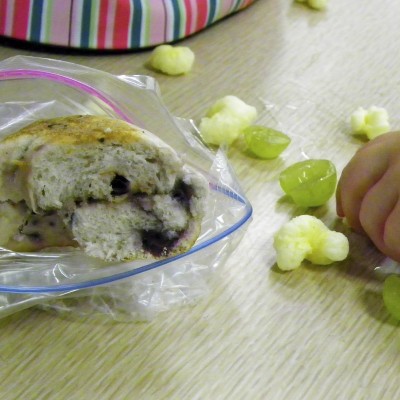
I was recently seated at a café, where two moms with young kids were seated at a neighboring table. I heard one mom make a snarky-remarky about a mutual friend. While mocking the absent woman for being a hovering mom, she simultaneously opened her 3 year old’s lunch bag and each of its individually wrapped items. She proceeded to put the spoon into the yogurt, flip open the spout on the sippy cup and tear the bagel into bite sized pieces. Was this a case of the hummingbird calling the helicopter hovery, or what?!
But clearly she did not see herself as hovering. This got me thinking. Maybe what’s going on in our society–parents confident they aren’t hoverers when clearly they are–is more than denial or simple issue of semantics.
How did we go from my generation, where we headed out to play and didn’t touch base again until we were hungry hours later, to a generation where moms can confidently site exactly what their child has eaten, the number of times they’ve gone to the toilet and when and where they last washed their hands?
The shift started when, through the expansion of media into our everyday lives, we became aware, often quite graphically, of childhood abductions. Statistics show there has been no dramatic rise in the occurrence of such tragedies. But as faces began to appear on milk cartons, as crime stopper TV shows flourished, as products appeared on the market capitalizing on parents’ fears, we as a nation went from a parenting model that fostered impendence to one so vigilant as to teach helplessness.
Just this morning driving into the parking lot at the gym, a child being dropped off to summer camp stepped right in front of my moving car. Mom was stuffing the boy’s things into his backpack (why wasn’t the kid doing this himself?) and the boy stepped away from the car without looking to see if the road was clear. I don’t think it was a case of his being a space cadet. Rather, if he always has an adult at his side who looks both ways, then he never looks for himself. Children need to perceive danger if we are to expect them to devise ways to mitigate danger.
I witness this learned helplessness again and again as a preschool teacher. Children who are never left to their own devises, don’t devise ways to do even the most routine of activities. I’ve seen 4 year olds unhappy about having sand in their shoes but unable to take the obvious and simple steps to deal with it.
We all know it is so much easier, and faster, to do things for them. Parents often impede their child’s learning to act independently in favor of efficiency. It’s a vicious cycle where the parent comes to believe their child can’t do X and so does X for the child and so the child never learns to do X, and so on. It’s not that they can’t or won’t, it’s that they never get the chance to figure out how to do it on their own. Again and again I have parents of students marvel at how their child competently handles tasks at school that mom or dad does for them at home.
So how do we shut off our helicopter motors without leaving our children vulnerable in a world which does in fact have dangers? First off it’s got to be a goal that you take seriously, as in seriously looking for opportunities to allow them more freedom.
When my kids were little and wanted to use the bathroom at the playground, I wasn’t comfortable letting them run across the field to enter the restroom alone. I wanted to know there wasn’t a creep lurking in a stall. I’d walk them in, check that it was unoccupied and then leave them to their business while I waited outside, preferably 50-100 yards away where I could still watch the entrance but where they had to exit and find their way back to me without my help.
And for day to day tasks, allow them to do for themselves, unless for reasons of safety you must help. That means they pick their clothes for the day. Mismatch, misbuttoned, and inappropriate attire for the weather never killed anyone. And aw shucks, if they leave home without a coat or if they put their shoes on the wrong feet, pretty soon they’ll be uncomfortable and have to figure out how to fix the problem on their own.
Packing their lunchbox is chore that should be theirs not yours. My guys were on lunchbox duty starting in 1st grade. My job was to be sure the kitchen was stocked with healthy things for them to toss in, but the tossing was their responsibility. Maybe they don’t pack enough one day and the hunger they feel alerts them that tomorrow they’re going to want to pack more. An added benefit to this approach was they seldom came home with food they hadn’t eaten. Only they could know if they were in the mood for strawberries instead of grapes.
I advocate having your child do as many of the little jobs that come up through out the day as time allows. Be sure to be there to help them. But be equally sure to stop yourself from helping too soon or doing it for them.
So to that mom in the café I’d say, let your little girl figure out how to get her lunch bag unpacked. BTW, if she figures out how to open a cheese stick without resorting to scissors (or power tools), I’d love to know.







